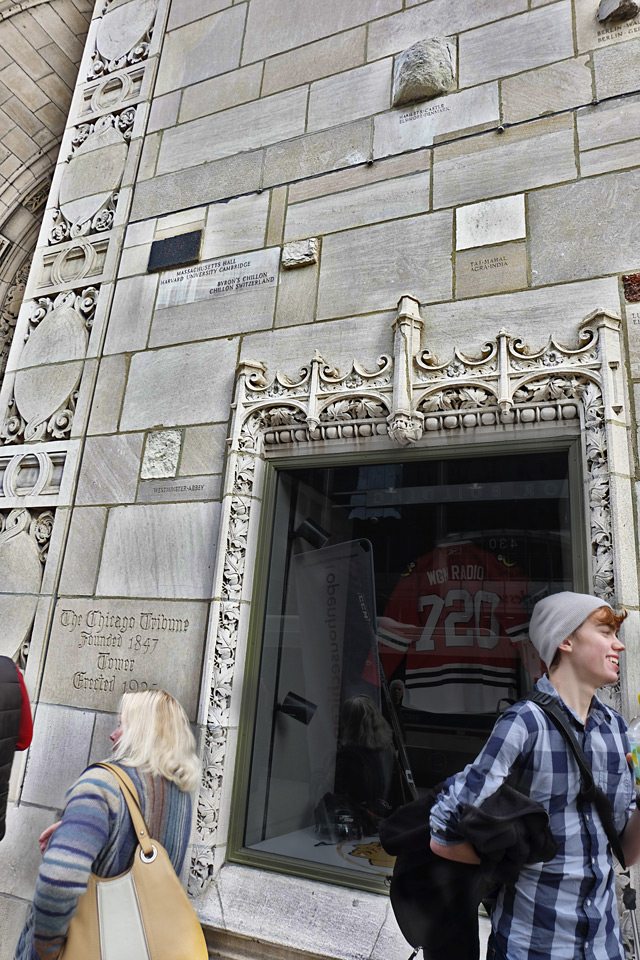Hole in the Clouds
Dec 23, 2009
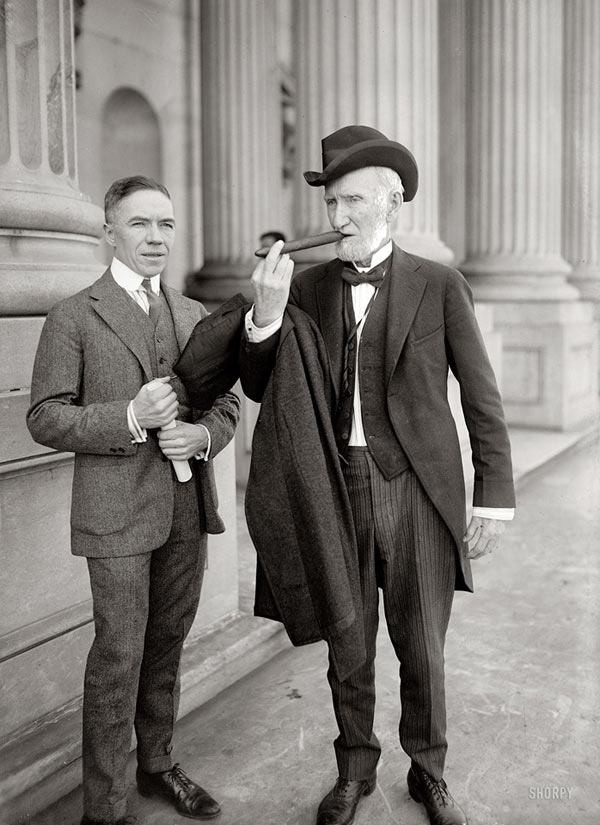
That would be Joseph "Uncle Joe" Cannon, a.k.a. "Foul-mouth Joe," the gentleman from Illinois with the really big cigar. Here he poses in 1922 with Rep. Vincent Brennan of Michigan. Speaker Cannon retired the next year, after representing Illinois in the House, with a couple of interruptions, since 1872, and serving as Speaker of the House from 1903 to 1911. Brennan also retired in 1923, after representing Michigan without distinction for two years.
Foul-mouth Joe's personal history in politics went back all the way to supporting Abraham Lincoln for president. As the cigar suggests, his political style was that of the smoke-filled room and his ideological beliefs were old-school through and through. Twentieth-century populism was nonsensical in his eyes; "I am goddamned tired of listening to all this babble for reform," he once said. "America is a hell of a success."
And turn-of-the-century reformers, notably Theodore Roosevelt, had gone way too far, according to Cannon: "Roosevelt has no more use for the Constitution than a tomcat has for a marriage license."
His political skills and rhetorical flourishes are memorialized on Capitol Hill to this day; the Cannon House Office Building is named after him. And Time magazine put him on the cover of its very first issue in 1923.
But nobody in Congress dresses with such distinction any more.
Joseph Cannon
Vincent Brennan
U.S. House of Representatives
smoke-filled room
cigar
politics
(Image credit: Nat'l Photo Co., via Shorpy)
Nov 23, 2011
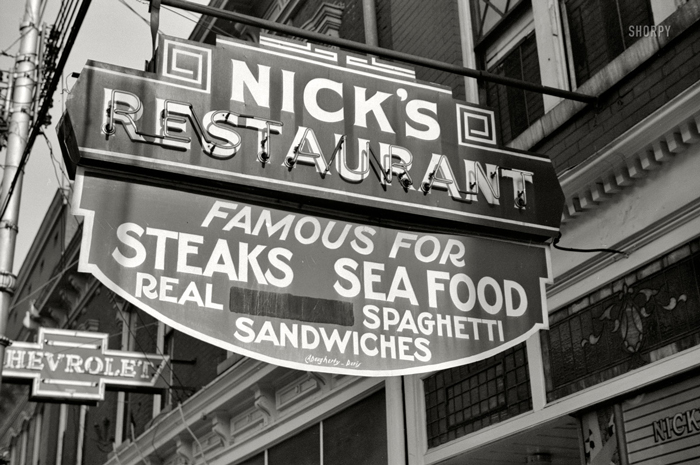 In 1940, Nick chose to black out one word on the sign in front of his Greek restaurant in Paris, Kentucky, the word that came between "real" and "spaghetti." Mussolini's Fascist regime had just invaded Greece, and the now-missing word, of course, must have been "Italian."
In 1940, Nick chose to black out one word on the sign in front of his Greek restaurant in Paris, Kentucky, the word that came between "real" and "spaghetti." Mussolini's Fascist regime had just invaded Greece, and the now-missing word, of course, must have been "Italian."
streetscape
politics
World War II
signage
Paris, Kentucky
1940
(Image credit: John Vachon, Farm Security Administration)
Sep 9, 2012
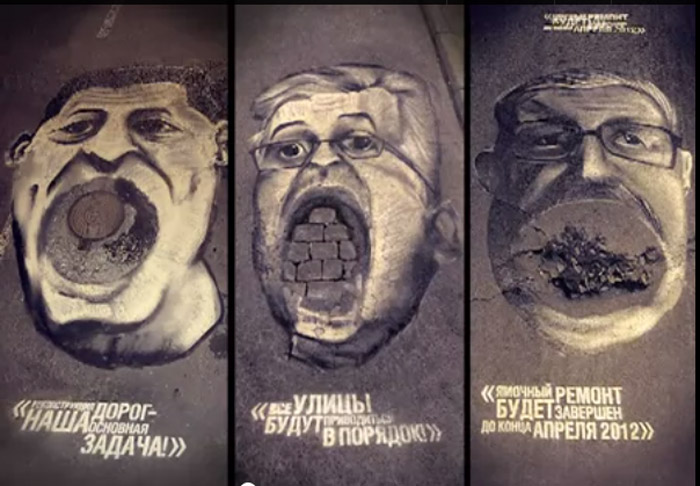 We all know that artists are often politically minded people, and that much art is intended, on some level or another, to communicate political ideas. But we all also know that works of political art, regardless of whether or not they succeed artistically, usually fail to directly accomplish much of anything politically. The paintbrush is not often mightier than the sword.
We all know that artists are often politically minded people, and that much art is intended, on some level or another, to communicate political ideas. But we all also know that works of political art, regardless of whether or not they succeed artistically, usually fail to directly accomplish much of anything politically. The paintbrush is not often mightier than the sword.
A couple of months ago, artwork on the streets of Yekaterina, Russia, a city of almost two million people about a thousand miles east of Moscow, got the political job done. The city fathers of Yekaterina–the regional governor, the mayor, and the vice-mayor–had all been elected on promises to repair potholes and other problems in the city's badly deteriorating roadways. Once in office, however, they seemed to lose interest; despite citizen complaints, the potholes just kept getting worse and worse.
One dark night in July, Yekaterina artists took to the streets of center city and painted portraits of the three well-known politicians with wide-open mouths surrounding three of the worst potholes. They documented their work with a video that they posted to a popular local website; an English-language video about their video is here.
The next day, the potholes were fixed and the portraits scrubbed from the pavement. Officials denied that the artwork had anything to do with the sudden burst of municipal maintenance.
Yekaterina was already a city with a certain artistic sensibility; in addition to their potholes, the downtown streets feature a bronze monument to Michael Jackson.
Russia
art
streetscape
politics
action
Yekaterinburg
Sverdlovsk Oblast
(ura dot ru via thisiscolossal dot org)
Oct 26, 2013

In the 1880s, when he was a little boy, there were so many McCormick relatives also named Robert that they called him Bertie. He inherited a townhouse in Chicago, a suburban house in Lake Forest, and a country estate called Cantigny in Wheaton, Illinois, about twenty miles out of town. The flowers amongst the reeds above were blooming last week in Cantigny, which is now a museum and park.
But Robert McCormick's two most significant inheritances from his wealthy and industrious family were reactionary politics and a newspaper, the Chicago Tribune. Tribune editorials ranted against the New Deal and everything else civilized or modern. But McCormick built the paper up into a huge media empire run out of a downtown office tower that he decorated with chunks of rock from other buildings around the world including, as seen below, Westminster Abbey, the Taj Mahal, Hamlet's castle in Denmark, Byron's Chillon in Switzerland, and the Berlin Wall.
Chicago
politics
Robert McCormick
journalism
fascist
reactionary
Tribune
Cantigny
(Image credits: Little Fuji)
Mar 21, 2014
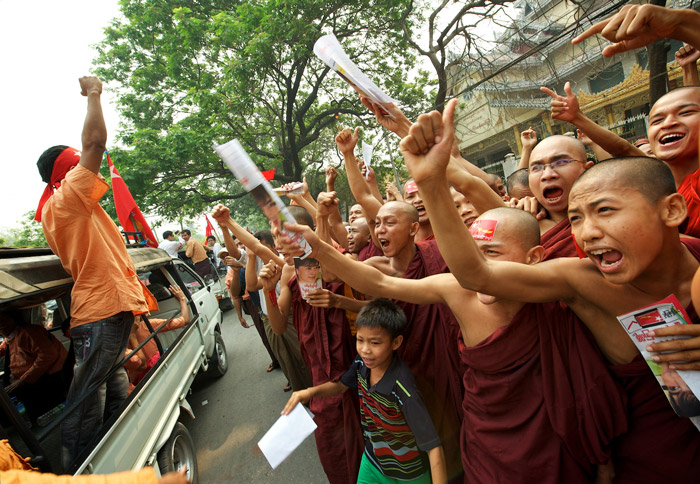 After more than fifteen years of imprisonment and house arrest, Myanmar's renowned democratic activist Aung San Suu Kyi was released by military authorities in time to participate in the 2012 parliamentary elections. Huge crowds, including these Buddhist monks in Mandalay, the country's second largest city, gathered to support Suu Kyi and her fellow candidates from the National League for Democracy, which won 43 of 45 contested seats and chose Suu Kyi as official leader of the opposition.
After more than fifteen years of imprisonment and house arrest, Myanmar's renowned democratic activist Aung San Suu Kyi was released by military authorities in time to participate in the 2012 parliamentary elections. Huge crowds, including these Buddhist monks in Mandalay, the country's second largest city, gathered to support Suu Kyi and her fellow candidates from the National League for Democracy, which won 43 of 45 contested seats and chose Suu Kyi as official leader of the opposition.
Monks had long been active in the struggle against Myanmar's military regime; many had been shot for pro-democracy activities. Suu Kyi's release from detention signaled a new stage in the country's political development, which was celebrated enthusiastically.
Even today, civil liberties are still tightly restricted in Myanmar and the military has loosened its grasp only incrementally.
But shortly after the 2012 election, Suu Kyi was finally able to travel to Stockholm, where she accepted the Nobel Peace Prize that she had been awarded in absentia twenty years earlier.
streetscape
politics
parade
Aung San Suu Kyi
Mandalay
monks
Myanmar
(Image credit: Valerio Berdini via The Image)
Mar 25, 2018
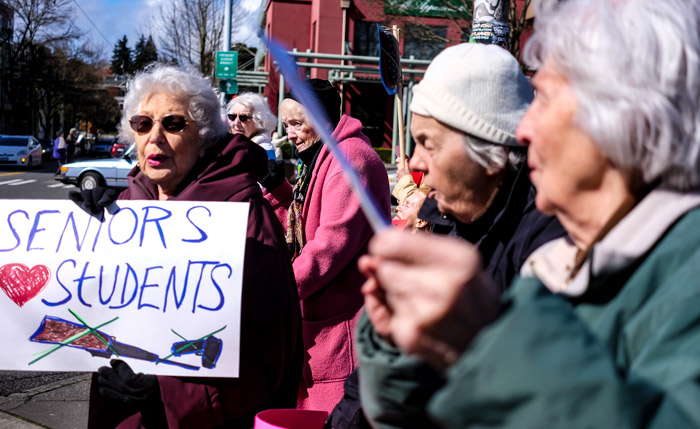 Our friends and neighbors who live in University House Wallingford joined the nationwide anti-gun/anti-Trump protest Saturday, braving the cold and the traffic to make sure their voices were heard.
Our friends and neighbors who live in University House Wallingford joined the nationwide anti-gun/anti-Trump protest Saturday, braving the cold and the traffic to make sure their voices were heard.
Most University House residents are in their eighties or nineties. At least one of the protesters is a centenarian. Some of them rarely leave home on foot, wary of the neighborhood's uneven sidewalks. But this was important.
They held up handmade posters calling for gun control and school safety, taking up positions at a major intersection where Saturday shoppers would have to take notice.
Cars honked in their honor. Pedestrians thanked them. One storekeeper distributed gifts–well, gag gifts, since that was the store's specialty: little plastic fingers they could use for pointing at their signs.
Another neighbor, who'd ventured out to the grocery store for a gallon of milk, bought candy bars for all the protesters.
Time will tell how the politicians will respond.





politics
street scene
Seattle
demonstration
University House
Wallingford
(Image credits: Fuji T)


 We all know that artists are often politically minded people, and that much art is intended, on some level or another, to communicate political ideas. But we all also know that works of political art, regardless of whether or not they succeed artistically, usually fail to directly accomplish much of anything politically. The paintbrush is not often mightier than the sword.
We all know that artists are often politically minded people, and that much art is intended, on some level or another, to communicate political ideas. But we all also know that works of political art, regardless of whether or not they succeed artistically, usually fail to directly accomplish much of anything politically. The paintbrush is not often mightier than the sword. In the 1880s, when he was a little boy, there were so many McCormick relatives also named Robert that they called him Bertie. He inherited a townhouse in Chicago, a suburban house in Lake Forest, and a country estate called Cantigny in Wheaton, Illinois, about twenty miles out of town. The flowers amongst the reeds above were blooming last week in Cantigny, which is now a museum and park.
In the 1880s, when he was a little boy, there were so many McCormick relatives also named Robert that they called him Bertie. He inherited a townhouse in Chicago, a suburban house in Lake Forest, and a country estate called Cantigny in Wheaton, Illinois, about twenty miles out of town. The flowers amongst the reeds above were blooming last week in Cantigny, which is now a museum and park.